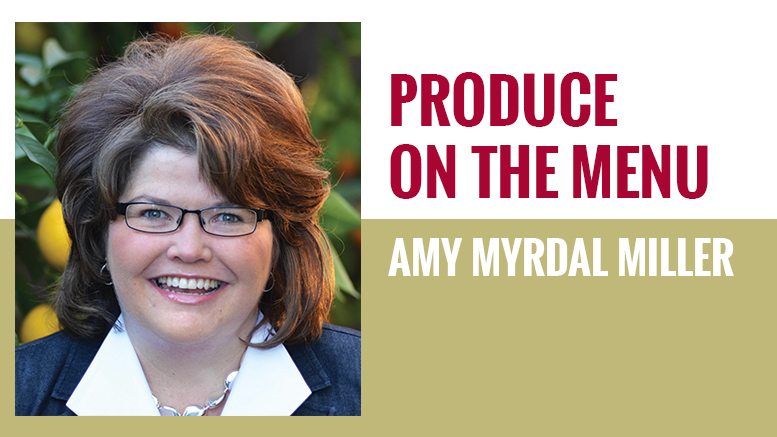The Future of Foodservice Post COVID-19
July 15, 2020 | 5 min to read
The COVID-19 pandemic severely impacted the restaurant industry, resulting in the loss of 3 million jobs, or 20% of its workforce. Experts forecasted a lasting shift toward healthful, plant-forward dining, as consumer interest in nutritious options may rise post-pandemic. The need for safety and sanitation will influence perceptions of healthful eating, while diners will seek a balance of taste and healthier choices. This evolution presents a unique opportunity for the produce industry to promote functional benefits.

Originally printed in the June 2020 issue of Produce Business.
As I’m writing this, the entire foodservice industry is obsessed with the future. I sought answers to these questions and more from industry experts.
What has been the employment Impact of COVID-19?
The restaurant industry employs 10% of the nationwide workforce, providing approximately 15.6 million jobs. In March, the industry lost 3 million jobs or a fifth of its workforce. As we move through spring and into summer, the industry will likely be forced to continue to shrink the size of its workforce.
How will consumer eating habits change post COVID-19?
“My feeling is that there will be the same interest in healthful menu options as in the past,” says Ron DeSantis, Certified Master Chef and principal advisor at CulinaryNxt, a culinary services consulting firm. “There will be some initial talk about healthy, but habits are hard to break. Those individuals who normally choose healthy menu options will continue to do so, and those that don’t won’t.”
Colleen McClellan, director of client solutions at Datassential believes that post COVID-19 a larger share of consumers may be interested in healthful eating. “Our tracking data suggest that consumers are currently turning to comfort foods, baking and snacking more, and stress eating. There might be some weight gain during this time that consumers will seek to lose,” says McClellan, thereby driving interest in ‘better-for-you’ menu options.
Ken Toong, executive director Auxiliary Enterprises for the University of Massachusetts, Amherst says, “We noticed during the current COVID-19 pandemic that our make-to-order salad concept is one of the most popular stations in our major retail outlet. Our students feel that greens will nourish the body and further protect against disease and infection. They are driven to eat a delicious meal that provides a variety of fresh fruits and vegetables and this has become a comfort food for the mind and body.”
We see a distinct possibility that longer term trends towards healthy, good-for-you, plant forward dining will accelerate as a result of COVID-19.
“We see a distinct possibility that longer term trends towards healthy, good-for-you, plant forward dining will accelerate as a result of COVID-19,” says Ephi Eyal, president of Hinoman USA, which produces Mankai, the world’s smallest green leafy vegetable.
Chef Dan Coudreaut, managing director at Coudreaut & Associates and former vice president of Culinary Innovation at McDonald’s, asserts that healthful eating among the general public is a behavior with staying power. “I believe that eating in a more balanced and mindful way has become part of our culture and is a customer behavior,” says Chef Dan. “Freshness, food credibility and clean labels are all strengths for the produce industry.”
Maeve Webster, president of Menu Matters, says, “I believe the interest in healthy foods will continue and could even rise. I think there’s going to be an increased focus on functional foods, specifically those focused on immunity, stress reduction, sleep and mood enhancement. After months of fear about catching a disease, I think it will significantly accelerate interest in food as medicine and a way to ensure you are as healthy as possible to withstand future issues.” This presents a powerful opportunity for produce marketers to play up the science-backed functional benefits of produce.
Deanne Brandstetter, vice president of Nutrition and Wellness for Compass Group, North America, says, “I think post COVID-19 guests will be obsessed with staying healthy and maintaining a strong immune system. Of course, that means they may more easily fall prey to snake-oil type ‘immune-boosting’ claims for specific foods and menu items. There is an opportunity to promote healthful menu offerings as part of a package that also focuses on overt food safety and sanitation practices.” Restaurants will need to make safety and sanitation practices visible, while produce industry leaders will need to ensure that foodservice operators as well as consumers know and trust that produce is safe.
Erin Kappelhof, managing partner at Eat Well Global, says, “I think the perception of ‘healthful’ will change, and some consumers will be more concerned with food safety, hygiene and sourcing than pre-COVID-19.” Erin’s predication may mean the produce industry needs enhanced messaging to support the safety of produce grown outside of the U.S.
Jeff Miller, president of Cutting Edge Innovation, a foodservice sales, business development and strategy firm, says, “At restaurants, diners will continue to be concerned primarily with taste. That doesn’t mean diners will only seek out indulgence and comfort food. It presents the challenge to restaurants that has always been the challenge—creating healthy options that are irresistible.”

Amy Myrdal Miller, MS, RDN, FAND is a farmer’s daughter from North Dakota, award-winning dietitian, culinary nutrition expert and founder and president of Farmer’s Daughter Consulting, Inc. She is the director of The Culinary Institute of America Healthy Menus R&D Collaborative and a consultant for the Produce for Better Health Foundation. You can learn more about her business at www.farmersdaughterconsulting.com, and you can follow her insights on food and flavor on social media @AmyMyrdalMiller.
11 of 18 article in Produce Business July 2020

